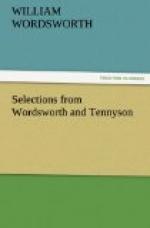79. PELEUS. All the gods, save Eris, were present at the marriage between Peleus and Thetis, a sea-deity. In her anger Eris threw upon the banquet-table the apple which Paris now holds in his hand. Peleus and Thetis were the parents of the famous Achilles.
81. IRIS. The messenger of the gods. The rainbow is her symbol.
83. DELIVERING=announcing.
89-100. These lines, and the opening lines of the poem are among the best of Tennyson’s blank verse lines, and therefore among the best that English poetry contains. The description owes some of its beauty to Homer. In its earlier form, in the volume of 1832-3, it is much less perfect.
132. A CRESTED PEACOCK. The peacock was sacred to Here (Juno).
103. A GOLDEN CLOUD. The gods were wont to recline upon Olympus beneath a canopy of golden clouds.
104. DROPPING FRAGRANT DEW. Drops of glittering dew fell from the golden cloud which shrouded Here and Zeus. See Iliad, XIV, 341 f.
105 f. Here was the queen of Heaven. Power was therefore the gift which she naturally proffered.
114. Supply the ellipsis.
121-122. POWER FITTED—WISDOM. Power that adapts itself to every crisis; power which is born of wisdom and enthroned by wisdom (i.e. does not owe its supremacy to brute strength).
121-122. FROM ALL-ALLEGIANCE. Note the ellipsis and the inversion.
128-131. WHO HAVE ATTAINED—SUPREMACY. Cf. Lotos Eaters, l. 155 f, and Lucretius, 104-108.
The gods, who haunt
The lucid interspace of world and world
Where never creeps a cloud, or moves a
wind,
Nor ever falls the least white star of
snow,
Nor ever lowest roll of thunder moans.
137. O’ERTHWARTED WITH=crossed by.
142 f. Compare the tone of Pallas’ speech with what has been said in the introduction, p. liv f., concerning Tennyson’s love of moderation and restraint, and his belief in the efficacy of law.
Compare also the general temper of the Ode on the Death of the Duke of Wellington, and especially ll. 201-205.
144—148. Yet these qualities are not bestowed with power as the end in view. Power will come without seeking when these great principles of conduct are observed. The main thing is to live and act by the law of the higher Life,—and it is the part of wisdom to follow right for its own sake, whatever the consequences may be.
151. SEQUEL OF GUERDON. To follow up my words with rewards (such as Here proffers) would not make me fairer.
153-164. Pallas reads the weakness of Paris’s character, but disdains to offer him a more worldly reward. An access of moral courage will be her sole gift to him, so that he shall front danger and disaster until his powers of endurance grow strong with action, and his full-grown will having passed through all experiences, and having become a pure law unto itself, shall be commensurate with perfect freedom, i.e., shall not know that it is circumscribed by law.




